The Indigenous Women’s Speakers Series is co-hosted with the Centre for Indigenous Knowledges and Languages and co-sponsored by the Faculty of Health. Since 2017, the series has highlighted scholars working at the intersection of feminist and Indigenous scholarship.
Past Events
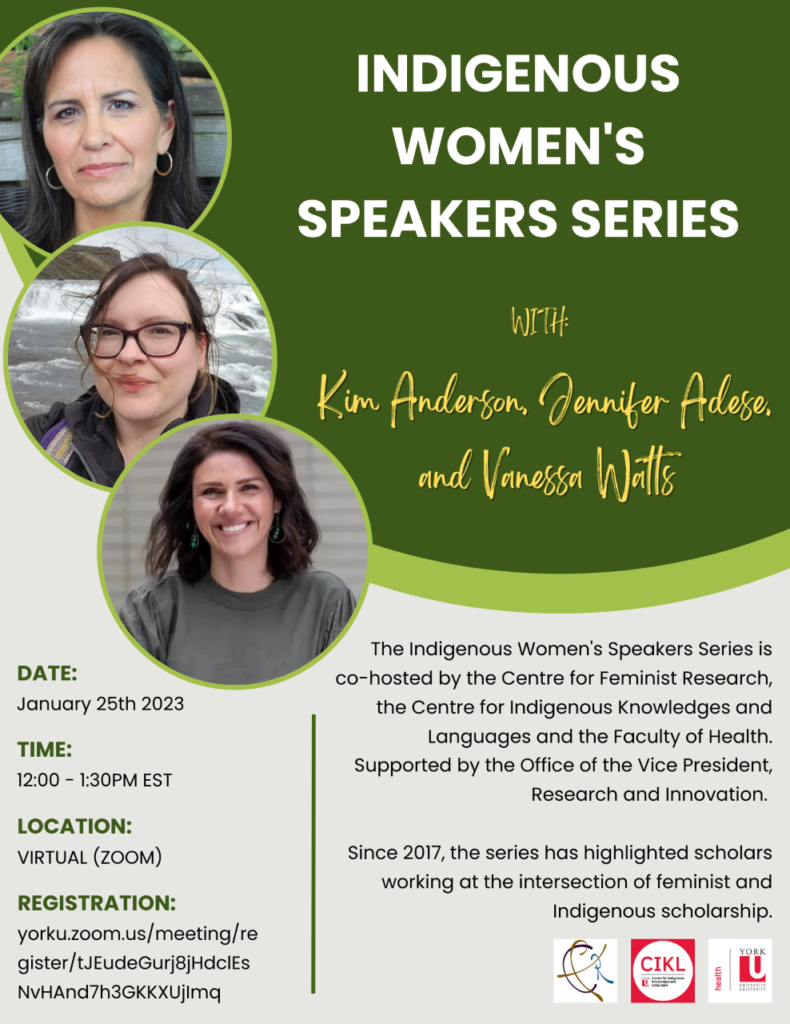
Indigenous Women’s Speakers Series with Kim Anderson, Jennifer Adese and Vanessa Watts
The 2022-23 series features Kim Anderson, Jennifer Adese, and Vanessa Watts.
Kim Anderson, Métis, is an Associate Professor in the Department of Family Relations and Applied Nutrition at the University of Guelph where she holds a Canada Research Chair in Indigenous Relationships. Her books include A Recognition of Being: Reconstructing Native Womanhood (CSPI, 2nd Edition, 2016) and Life Stages and Native Women: Memory, Teachings and Story Medicine (University of Manitoba Press, 2011).
Dr. Jennifer Adese (otipemisiwak/Métis) is the Canada Research Chair (CRC) in Métis Women, Politics, and Community, and an Associate Professor in the Department of Sociology at University of Toronto Mississauga (UTM). She is the author of Aboriginal™: The Cultural & Economic Politics of Recognition (University of Manitoba Press) and the co-editor of A People and a Nation: New Directions in Contemporary Métis Studies (UBC Press), and Indigenous Celebrity (University of Manitoba Press). Her work has also been published in journals such as TOPIA, American Indian Quarterly, SAIL: Studies in American Indian Literatures, MediaTropes, Decolonization: Indigeneity, Education & Society (DIES), Public, and appears in select edited anthologies on Indigenous land rights, colonization, art, activism, and resistance
Dr. Vanessa Watts is Mohawk and Anishinaabe Bear Clan, Six Nations of the Grand River. She is an assistant professor of Indigenous Studies and Sociology at McMaster University, and holds the Paul R. MacPherson Chair in Indigenous Studies. Her research examines Indigenist epistemological and ontological interventions on place-based, material knowledge production. Vanessa is particularly interested in Indigenous feminisms, sociology of knowledge, Indigenous governance, and other-than- human relations as forms of Indigenous ways of knowing.
Watch the video here.
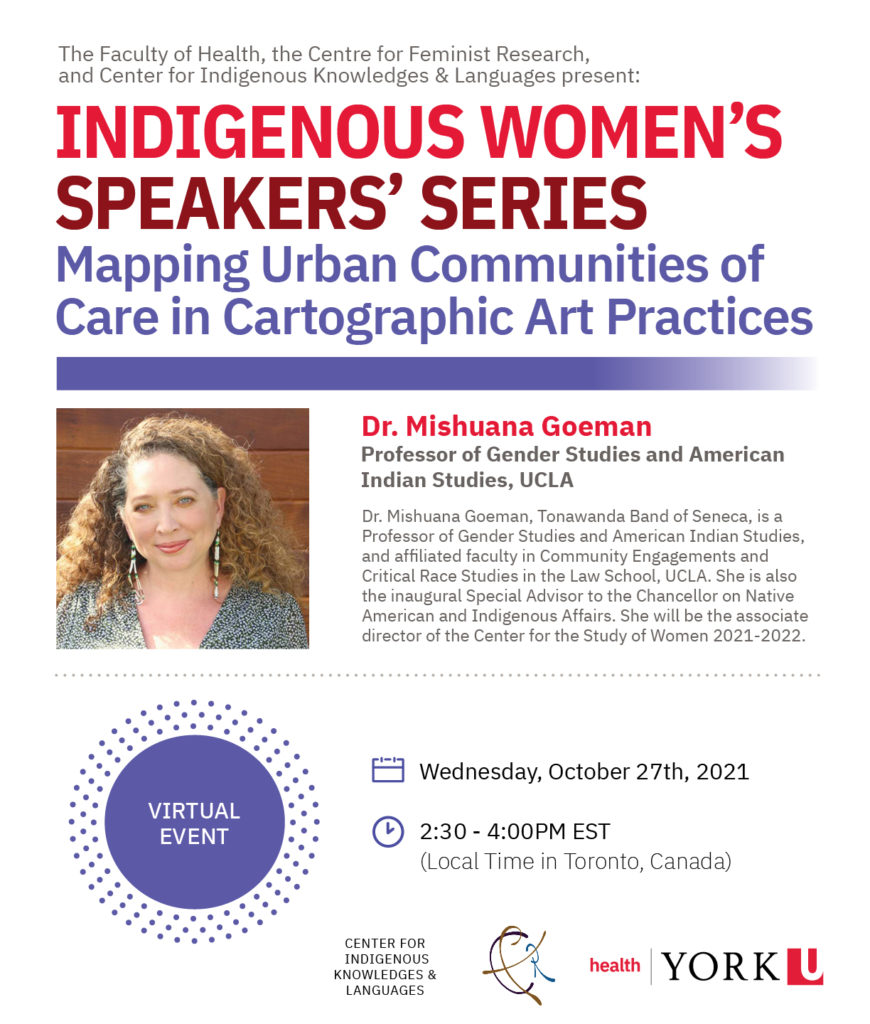
“Mapping Urban Communities of Care in Cartographic Art Practices” with Dr. Mishuana Goeman
Recently Indigenous artist have used cartographic tools in an artistic way to reinvision the colonial landscape, to speak to and against the mass development of Native land, uproot white supremacist architecture and create awareness of original peoples ongoing caretaking in the cityscape. Creating Indigenous Visibility in Urban Spaces is a necessary remapping of the city. Making visible Indigenous landscapes unsettle a visual settler terrain that structures ongoing dispossession. These powerful mappings are key as faceless mass development of tribal lands continue to threaten the ecologies and landscapes of Indigenous homelands, indeed all our homelands. Indians are the beautiful “graffiti,” in the words of Leeanne Betasamosake Simpson, denying settler permanence. Our art, bodies and actions are embodied sovereignty on the settler landscapes meant to erase and eradicate Indigenous forms of relationality. Artistic renditions of the relationship between the human, more-than-human, and landscapes are affective in nature and thus deep in mapping larger communities of care. We will explore the recent artistic maps of Cara Romero’s collaborative Tongva Land project, River Garza’s commissioned work for UCLA, and Mercedes Dorame’s installation at the Fowler’s The Map and the Territory alongside more traditional maps that depict the urban development of Los Angeles.
See the recording of the event here.
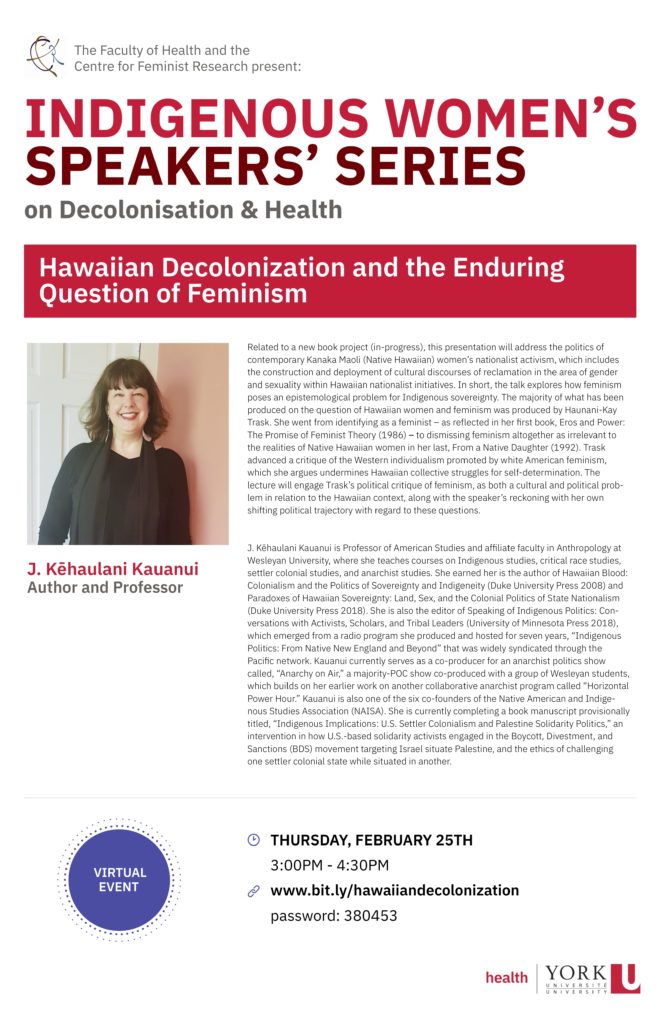
“Hawaiian Decolonization and the Enduring Question of Feminism” with J. Kēhaulani Kauanui
Related to a new book project (in-progress), this presentation will address the politics of contemporary Kanaka Maoli (Native Hawaiian) women’s nationalist activism, which includes the construction and deployment of cultural discourses of reclamation in the area of gender and sexuality within Hawaiian nationalist initiatives. In short, the talk explores how feminism poses an epistemological problem for Indigenous sovereignty. The majority of what has been produced on the question of Hawaiian women and feminism was produced by Haunani-Kay Trask. She went from identifying as a feminist – as reflected in her first book, Eros and Power: The Promise of Feminist Theory (1986) – to dismissing feminism altogether as irrelevant to the realities of Native Hawaiian women in her last, From a Native Daughter (1992). Trask advanced a critique of the Western individualism promoted by white American feminism, which she argues undermines Hawaiian collective struggles for self-determination. The lecture will engage Trask’s political critique of feminism, as both a cultural and political problem in relation to the Hawaiian context, along with the speaker’s reckoning with her own shifting political trajectory with regard to these questions.
Indigenous Women’s Speakers Series with Sharon McIvor
Sharon McIvor is a member of the Lower Nicola Band in British Columbia and a Thompson Indian. She is a lawyer and professor of Indigenous Studies at Nicola Valley Technical Institute, British Columbia’s Indigenous university, where she teaches about history, politics, colonization and human rights. McIvor is a leader in the legal battle in Indigenous women’s long search for equal status under federal law and the application of the Charter to Aboriginal issues. She was the plaintiff in McIvor v. Canada, 2009 BCCA 153, a ground-breaking constitutional challenge to the sex discrimination in the status provisions of the Indian Act. McIvor also served as the justice coordinator of the Native Women’s Association of Canada (NWAC), and she led the struggle during the Charlottetown constitutional talks to get the NWAC a seat at the table and equal funding with other Aboriginal organizations.
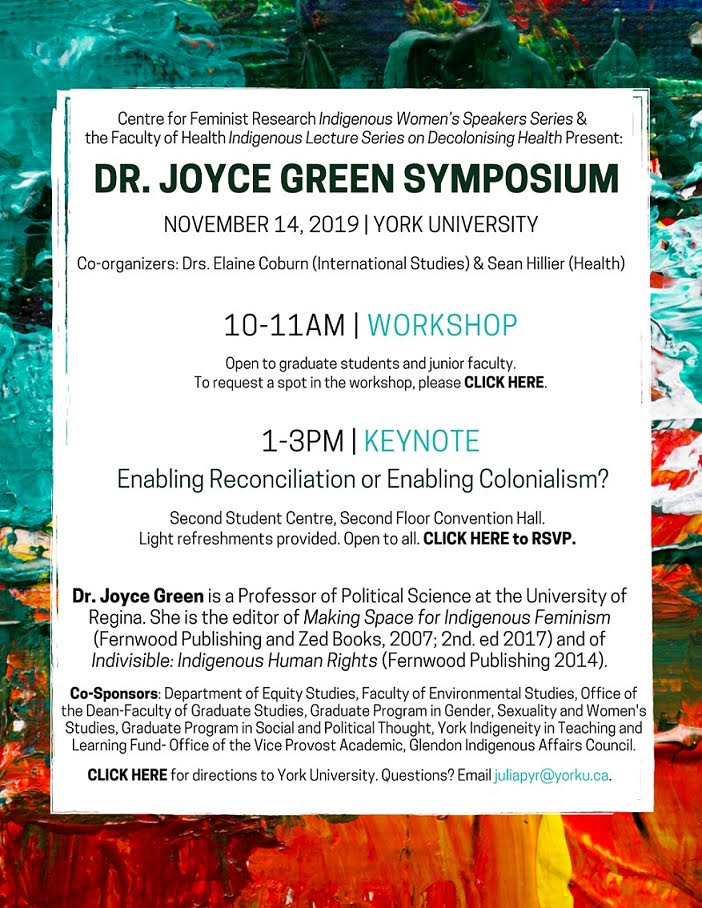
“Enabling Reconciliation or Enabling Colonialism?” with Dr. Joyce Green
Dr. Joyce Green is a Professor of Political Science at the University of Regina.
She has taught in the fields of Canadian politics, women and politics, and Native studies. Her research interests have focused on issues of decolonization in Canada, and of democracy in Canada. Most recently she has been preoccupied with the project of Indigenizing the university and with reconciliation problematics. Her published work has dealt with Indigenous-state relations; Indigenous feminism; citizenship, identity, and racism in Canada’s political culture; Indigenous human rights and with reconciliation in Canada. She is the editor of Making Space for Indigenous Feminism (Fernwood Publishing and Zed Books, 2007; 2nd. ed 2017) and of Indivisible: Indigenous Human Rights (Fernwood Publishing 2014). Dr. Green is of English, Ktunaxa, and Cree-Scottish Metis descent, and her family’s experiences have provoked much of her scholarly and political work. She currently lives in ʔa·kiskaqⱡi?it, in ʔamak̓is Ktunaxa (Cranbrook, B.C., in Ktunaxa territory).
“From Resistance to ‘Reconciliation’: Ruminations on Decolonization from a Feminist Metis Academic” with Professor Emma LaRocque
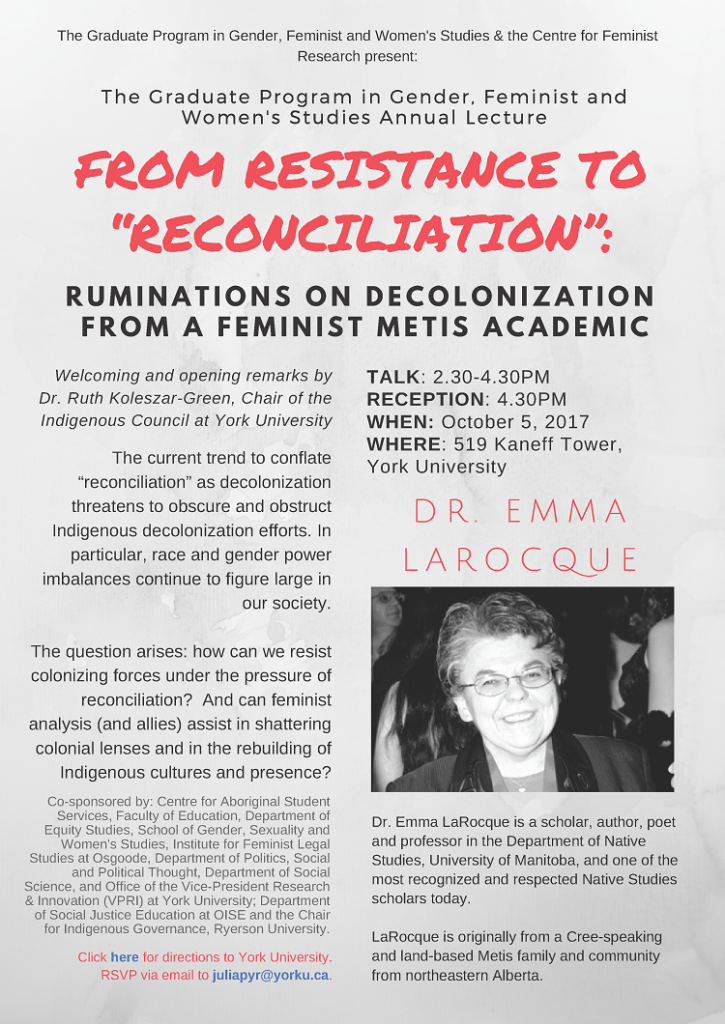
The current trend to conflate “reconciliation” as decolonization threatens to obscure and obstruct Indigenous decolonization efforts. In particular, race and gender power imbalances continue to figure large in our society. The question arises: how can we resist colonizing forces under the pressure of reconciliation? And can feminist analysis (and allies) assist in shattering colonial lenses and in the rebuilding of Indigenous cultures and presence?
Dr. Emma LaRocque is a scholar, author, poet and professor in the Department of Native Studies, University of Manitoba, and one of the most recognized and respected Native Studies scholars today. Dr. LaRocque has been a significant figure in the growth and development of Native Studies as a teaching discipline and an intellectual field of study. She has developed most of the core undergraduate courses and contributed to the development of graduate studies in the Native Studies Department at the University of Manitoba, where she has been teaching since 1977. Dr. LaRocque’s work has focussed on the deconstruction of colonial misrepresentation and on the advancement of an Indigenous-based critical resistance theory in scholarship. Her prolific career includes numerous publications in areas of colonization/decolonization, racism, violence against women, and First Nation and Metis literatures and identities. Her poems are widely anthologized in prestigious collections and journals. She is frequently cited in a wide variety of venues and has lectured locally, nationally and internationally on Indigenous/Re-settler, or colonizer/colonized relations.
In 2005, Dr. LaRocque received the National Aboriginal Achievement Award. She is author of Defeathering The Indian (1975) and of When the Other Is Me: Native Resistance Discourse 1850 – 1990 (2010), which won the Alexander Kennedy Isbister Award for Non-Fiction. LaRocque is originally from a Cree-speaking and land-based Metis family and community from northeastern Alberta.
